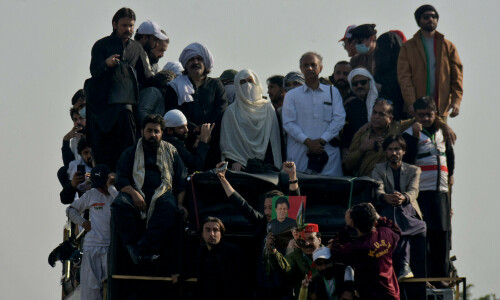 NEW YORK, Sept 22: President Gen Pervez Musharraf spelled out on Monday his strategy for fighting terrorism at home, which includes efforts to fight Al Qaeda as well as domestic religious extremists.
NEW YORK, Sept 22: President Gen Pervez Musharraf spelled out on Monday his strategy for fighting terrorism at home, which includes efforts to fight Al Qaeda as well as domestic religious extremists.
Addressing an international conference on terrorism, the president invited world leaders to see the link between terrorism and unresolved political issues that afflicted the Muslim world, and urged them to help resolve these as well.
Heads of states and governments from 15 countries are attending the conference, organized jointly by Norway and the International Peace Academy.
The theme, Fighting Terrorism for Humanity, generated an interesting debate, both in and outside the conference with speeches varying from an outright condemnation of the use of violence for resolving political disputes to appeals for looking into the causes of such violence.
“The fact is that today most of the unresolved political disputes and issues involve Muslims. Their demands for justice are often brushed aside. This has given rise to hopelessness, frustration and desperation,” said President Musharraf, who was one of the four keynote speakers.
“Foreign occupation and the suppression of the right of peoples to self-determination,” said the president, “is a direct cause of suicide bombings and terrorist acts that flow from a sense of despair.”
Pakistan, he said, had developed an effective intelligence network based on intelligence, technological capabilities and aerial surveillance to fight Al Qaeda.
This network, he said, was backed by an effective quick reaction force to hit located targets. “In the short-term strategy of striking against terrorists, we are well poised for success in Pakistan. A similar capability and action is required in the vast vacuums of Afghan countryside to produce the optimum impact in our region,” he added.
Responding to the criticism that the Taliban and Al Qaeda fighters are using the Pakistani territory for carrying out attacks in Afghanistan, he said: “Such aspersions display either deliberate discrimination or insufficient understanding of the ground realities. No nation has done more in the war against terrorism than Pakistan.”
STATE TERRORISM: Such short-term actions, he said, ought to be accompanied by a long-term strategy, otherwise, “the war against terrorism may fail”.
Explaining the link between terrorist attacks and state terrorism, the president said: “Mostly, state terrorism targets people seeking freedom from foreign occupation, as in Palestine and Kashmir. Their oppression through state terrorism is all the more unacceptable because they were assured self-determination by no less than the UN Security Council.”
Militancy in Palestine and Kashmir, he said, grew because political rights of these people were suppressed. “Kashmir saw the rise of an armed indigenous resistance in response to Indian repression,” he added.
Although emphasizing the link between political oppression and terrorist attacks, the president said: “Acts of violence and mass murder committed by individuals and groups cannot be justified... They kill innocent civilians and inflict havoc in our cities and towns. No ideology, no doctrine can justify their acts or condone their crimes.”
Gen Musharraf urged the need to evolve a definition of terrorism, which also condemned “state terrorism committed against occupied peoples”. Some states, he said, were prone to “depict legitimate movements for self-determination as terrorism”.
He said: “It is the UN’s responsibility to develop a definition of terrorism which clarifies that such movements for self-determination are legitimate and cannot be equated with terrorism.”
He urged the audience that also included foreign ministers from a large number of countries not to forget “most of the political disputes of our times afflict Islamic peoples and nations. Religious extremism and militancy have risen because these conflicts have been allowed to fester.”
He added: “There is a feeling in the Muslim world that Islam is being targeted.
President Musharraf declared: “Expressions such as Islamic terror, Muslim rage, Islamic threat and the crisis of Islam, offer only facile explanations. This widening gulf of perceptions between the West and the Islamic world must be bridged. There is no such thing as militant Islam. There are only some militant Muslims, as there are militant Hindus, Christians and Jews.”
The thesis of a clash of civilization, he said, was now increasingly embraced at the popular level. This, he said, was “a recipe for confrontation”.
The president urged the West:
* Not to be scared of the Shariat because it’s simply an Islamic way of life.
* To know that Islam and democracy are compatible and Islam prescribes the promotion of human rights, social equality, freedom of speech and adoption of decisions through consultation and consensus.
* Islam provides protection to minorities and makes no discrimination on the basis of colour, caste, creed or religion.
* Islam’s vision is not trapped in any one period of history, it is modern and futuristic.
The president, however, admitted that “today there’s a dichotomy between Islam’s principles and their actual practice. The extremist laws or practices through a twisted representation of the Shariat by vested, misguided interests in no way reflect the tolerant spirit and tenets of Islam.”
The Muslim world, he said, must shun militancy and extremism in favor of enlightened moderation. “We must reform those Madaris which are preaching hatred, extremism and militancy.”














































Dear visitor, the comments section is undergoing an overhaul and will return soon.